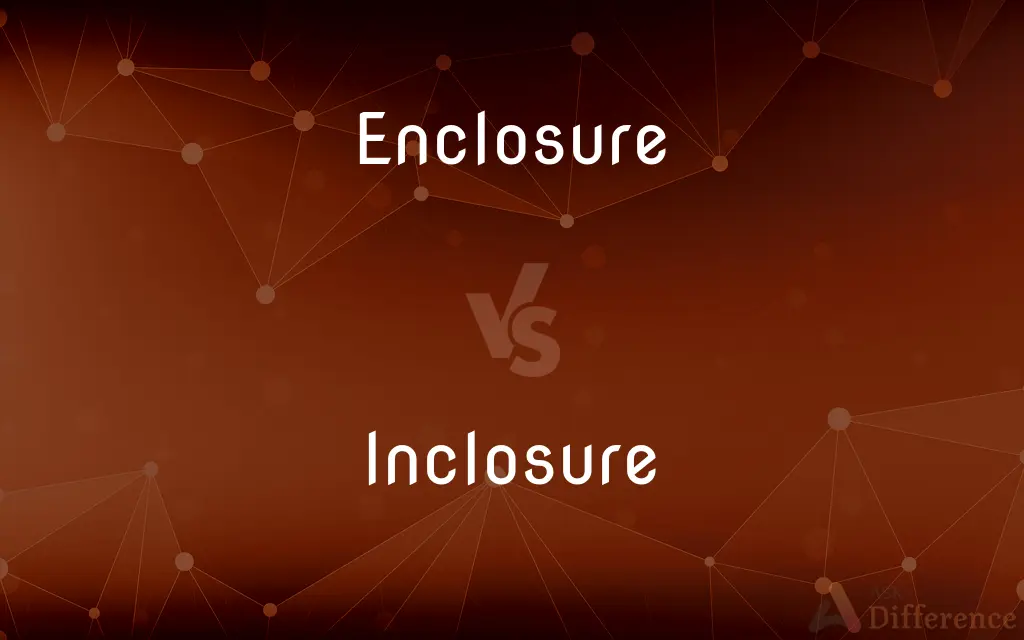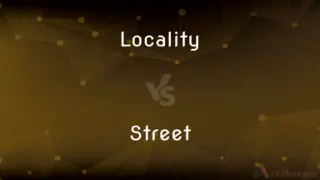Enclosure vs. Inclosure — What's the Difference?
By Urooj Arif & Maham Liaqat — Updated on March 22, 2024
Enclosure refers to an area surrounded by barriers, often for security or privacy, while inclosure is an alternate spelling less commonly used but denotes the same concept.

Difference Between Enclosure and Inclosure
Table of Contents
ADVERTISEMENT
Key Differences
Enclosure typically describes a space that is surrounded or enclosed by walls, fences, or other barriers, designed to secure, protect, or define the area within. This term can apply to various contexts, from wildlife reserves and agricultural fields to private gardens and secure installations. It emphasizes the physical boundary that separates the inside from the outside, serving purposes such as containment, privacy, or security. On the other hand, inclosure, while essentially synonymous with enclosure, is a less commonly used variant. Both terms share the same definitions and can be used interchangeably, though "enclosure" is more prevalent in contemporary usage and is preferred in most legal, technical, and everyday contexts.
The use of enclosure is widespread across many fields, including real estate, agriculture, and zoology, indicating an area that is specifically bounded for a particular use or protection. The term also carries historical significance, especially in the context of the Enclosure Acts in Britain, which transformed common land into private property. In contrast, inclosure, despite its identical meaning, appears less frequently in modern texts and discussions. It may still be found in historical documents, legal texts, or in specific regional usages, but its presence is notably rarer compared to enclosure.
In legal and technical documentation, the preference for "enclosure" is evident, as it clearly communicates the concept of a bounded space with intended restrictions or protections. The term is often used to specify areas designated for specific purposes, such as wildlife enclosures in a zoo, where the primary goal is to create a controlled environment that mimics natural habitats while ensuring the safety of both animals and visitors. Conversely, the use of "inclosure" in such contexts is less frequent, and when it does appear, it is typically in reference to the same concept of creating a bounded area, often without any distinction in meaning from enclosure.
In everyday language, "enclosure" is the term more commonly encountered, used to describe everything from fenced-off backyards to enclosed spaces within buildings, such as courtyards or atriums. Its versatility and clarity make it the preferred choice in both spoken and written English. "Inclosure," while understood, might give pause due to its rarity, leading to a preference for the more familiar "enclosure" to avoid confusion or the appearance of archaism.
Despite their interchangeability, the dominance of "enclosure" in contemporary usage underscores a general trend towards standardization in spelling and terminology, especially in terms that have multiple variants. This standardization facilitates clearer communication, particularly in global contexts where English serves as a lingua franca across diverse fields and disciplines.
ADVERTISEMENT
Comparison Chart
Definition
An area surrounded by barriers for protection, privacy, or containment.
An alternate spelling of enclosure, with identical meaning.
Usage
Widely used in contemporary English across various contexts.
Less commonly used, with identical meaning to enclosure.
Contexts
Real estate, agriculture, zoology, legal documents.
Historical documents, certain legal contexts, regional usage.
Purpose
To denote a physically bounded space for specific uses.
Same as enclosure, though less preferred in modern usage.
Prevalence
Preferred in most legal, technical, and everyday language.
Rare in modern texts, more likely to appear in historical references.
Compare with Definitions
Enclosure
A term for areas within zoos designated for animals.
The lion enclosure is the zoo's main attraction.
Inclosure
Historically used in legal contexts with the same meaning as enclosure.
The document specified the boundaries of the inclosure.
Enclosure
Used in agriculture to denote fenced areas.
The farmer added a new enclosure for the sheep.
Inclosure
Less commonly used in modern English but still correct.
The map detailed the area of the inclosure.
Enclosure
In real estate, referring to a bounded property area.
The property's enclosure includes a small forested area.
Inclosure
An alternate spelling of enclosure, denoting the same concept.
The inclosure act privatized common lands.
Enclosure
In documents, referring to additional items included.
Please see the enclosure for more details on the policy.
Inclosure
Found in historical texts referring to bounded spaces.
The ancient inclosure was believed to be a ceremonial site.
Enclosure
A space surrounded by a barrier for specific purposes.
The garden enclosure kept the deer away from the vegetables.
Inclosure
Occasionally seen in British English legal documents.
The inclosure was granted by the local council.
Enclosure
'Enclosure' or 'Inclosure' is a term, used in English landownership, that refers to the appropriation of "waste" or "common land" enclosing it and by doing so depriving commoners of their ancient rights of access and privilege. Agreements to enclose land could be either through a "formal" or "informal" process.
Inclosure
Alternative spelling of enclosure
Enclosure
The act of enclosing.
Inclosure
The act of inclosing; the state of being inclosed, shut up, or encompassed; the separation of land from common ground by a fence.
Enclosure
The state of being enclosed.
Inclosure
That which is inclosed or placed within something; a thing contained; a space inclosed or fenced up.
Within the inclosure there was a great store of houses.
Enclosure
Something enclosed
A business letter with a supplemental enclosure.
Inclosure
That which incloses; a barrier or fence.
Breaking our inclosures every morn.
Enclosure
Something that encloses.
Inclosure
Something (usually a supporting document) that is enclosed in an envelope with a covering letter
Enclosure
(countable) Something enclosed, i.e. inserted into a letter or similar package.
There was an enclosure with the letter — a photo.
Inclosure
The act of enclosing something inside something else
Enclosure
(uncountable) The act of enclosing, i.e. the insertion or inclusion of an item in a letter or package.
The enclosure of a photo with your letter is appreciated.
Enclosure
(countable) An area, domain, or amount of something partially or entirely enclosed by barriers.
He faced punishment for creating the fenced enclosure in a public park.
The glass enclosure holds the mercury vapor.
The winning horse was first into the unsaddling enclosure.
Enclosure
(uncountable) The act of separating and surrounding an area, domain, or amount of something with a barrier.
The enclosure of public land is against the law.
The experiment requires the enclosure of mercury vapor in a glass tube.
At first, untrained horses resist enclosure.
Enclosure
The act of restricting access to ideas, works of art or technologies using patents or intellectual property laws.
Enclosure
The post-feudal process of subdivision of common lands for individual ownership.
Strip-farming disappeared after enclosure.
Enclosure
(religion) The area of a convent, monastery, etc where access is restricted to community members.
Enclosure
Inclosure. See Inclosure.
Enclosure
Artifact consisting of a space that has been enclosed for some purpose
Enclosure
The act of enclosing something inside something else
Enclosure
A naturally enclosed space
Enclosure
Something (usually a supporting document) that is enclosed in an envelope with a covering letter
Common Curiosities
Can inclosure still be used in modern writing?
While less common, "inclosure" can still be used, especially in historical or specific legal contexts, but "enclosure" is generally preferred to avoid confusion.
Is there a context where inclosure is preferred over enclosure?
Inclosure might be preferred in historical discussions or documents that use the older spelling, but in contemporary usage, enclosure is overwhelmingly favored.
Why is enclosure more commonly used than inclosure?
Enclosure is more prevalent due to standardization in spelling and terminology in contemporary English, making it the preferred form in most contexts.
What are the benefits of using enclosures in agriculture?
Enclosures in agriculture can protect crops from wildlife, delineate property boundaries, and manage livestock, contributing to more efficient farming practices.
How does one determine the boundary of an enclosure?
The boundary of an enclosure is determined by physical barriers such as fences, walls, or natural features, and is often legally defined in property documents.
Do enclosure and inclosure have the same legal implications?
Yes, in legal contexts, both terms refer to an area surrounded by a barrier with the same legal implications and uses.
What is the difference between enclosure and inclosure?
There is no significant difference in meaning; "inclosure" is an alternate spelling of "enclosure," though "enclosure" is far more commonly used.
Are there any famous historical enclosures?
The Enclosure Acts in Britain are a well-known historical example, where common lands were transformed into privately owned property, significantly impacting agricultural practices and land use.
How do enclosures impact wildlife?
Wildlife enclosures in zoos or reserves are designed to mimic natural habitats as closely as possible while ensuring the safety and well-being of the animals and visitors.
Can enclosures be used for privacy?
Yes, enclosures are commonly used to create private spaces, especially in residential areas, by surrounding a property or space with walls or fences.
Share Your Discovery

Previous Comparison
Locality vs. Street
Next Comparison
Porcupine vs. HedgehogAuthor Spotlight
Written by
Urooj ArifUrooj is a skilled content writer at Ask Difference, known for her exceptional ability to simplify complex topics into engaging and informative content. With a passion for research and a flair for clear, concise writing, she consistently delivers articles that resonate with our diverse audience.
Co-written by
Maham Liaqat













































